外研版(2019)必修第一册Unit1A new start Section Ⅱ Using language课件(69页PPT)
文档属性
| 名称 | 外研版(2019)必修第一册Unit1A new start Section Ⅱ Using language课件(69页PPT) | 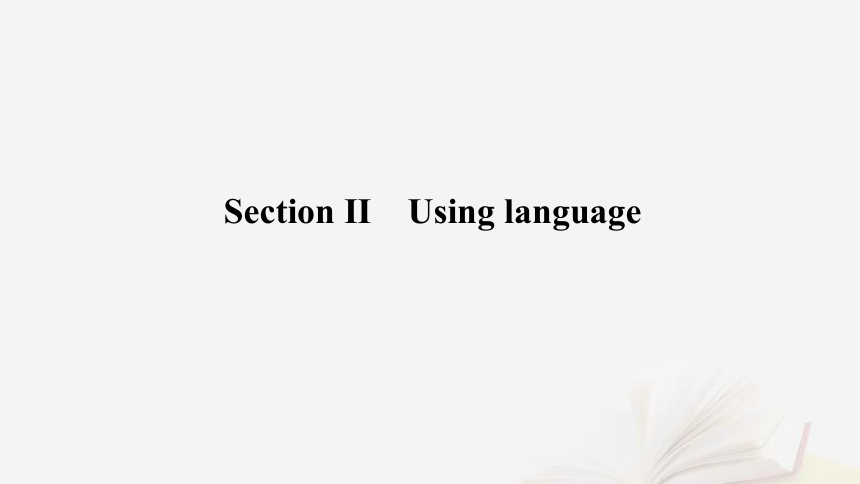 | |
| 格式 | pptx | ||
| 文件大小 | 288.1KB | ||
| 资源类型 | 教案 | ||
| 版本资源 | 外研版(2019) | ||
| 科目 | 英语 | ||
| 更新时间 | 2022-09-28 18:15:10 | ||
图片预览

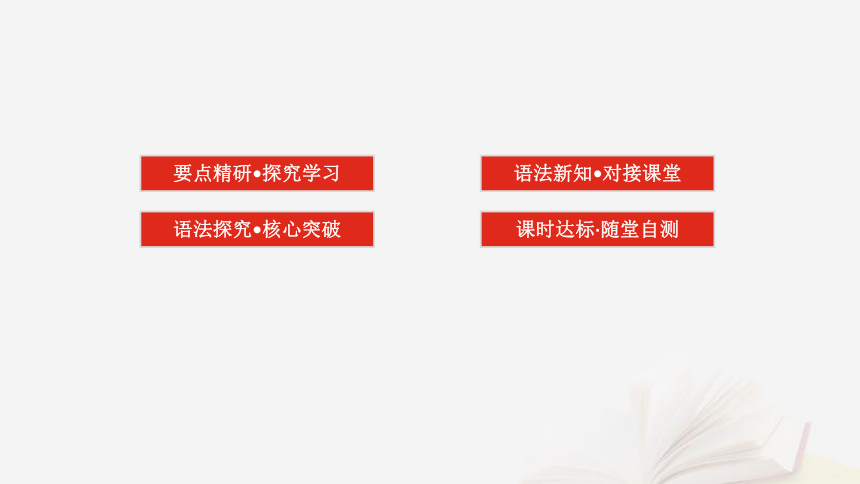

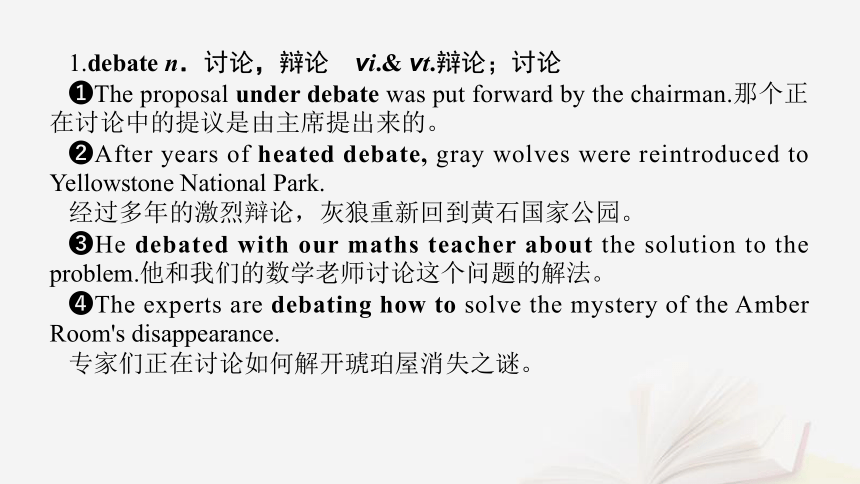
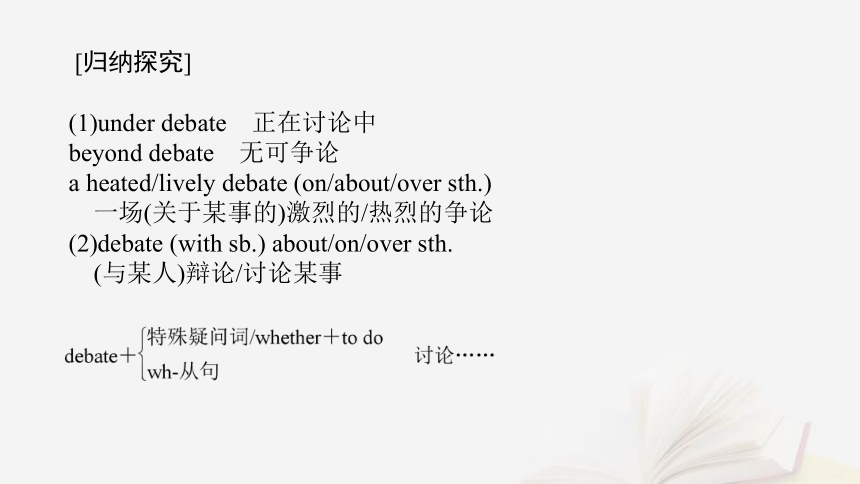

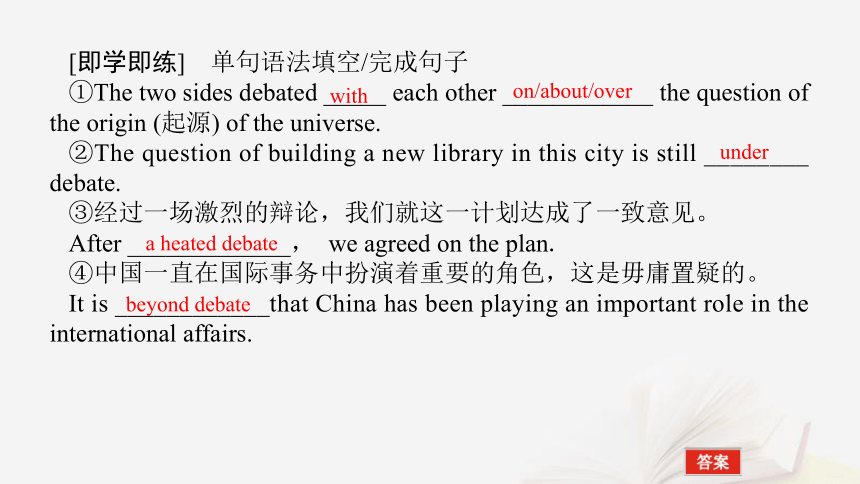
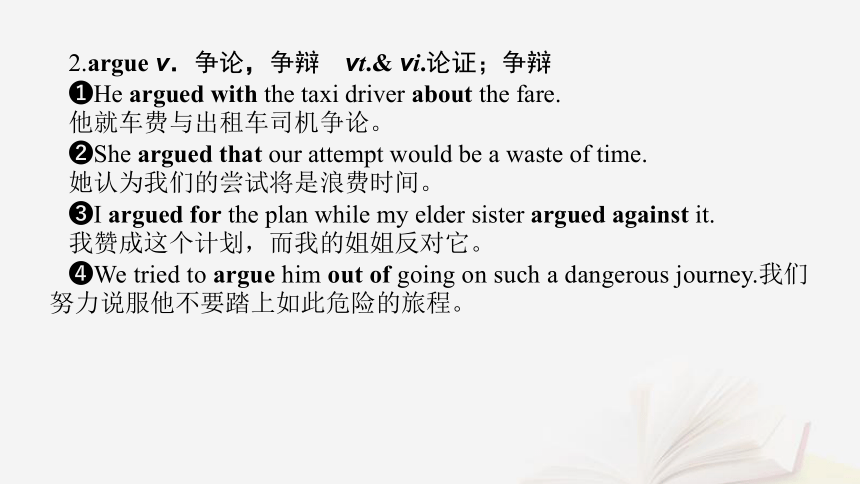
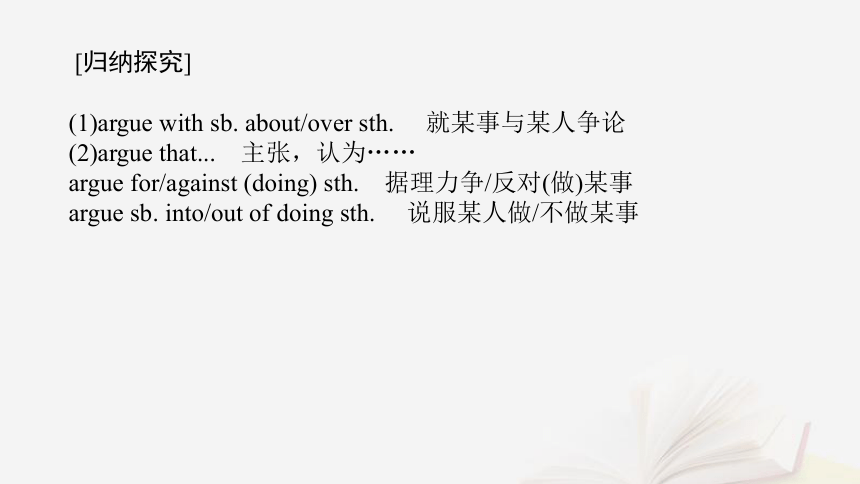
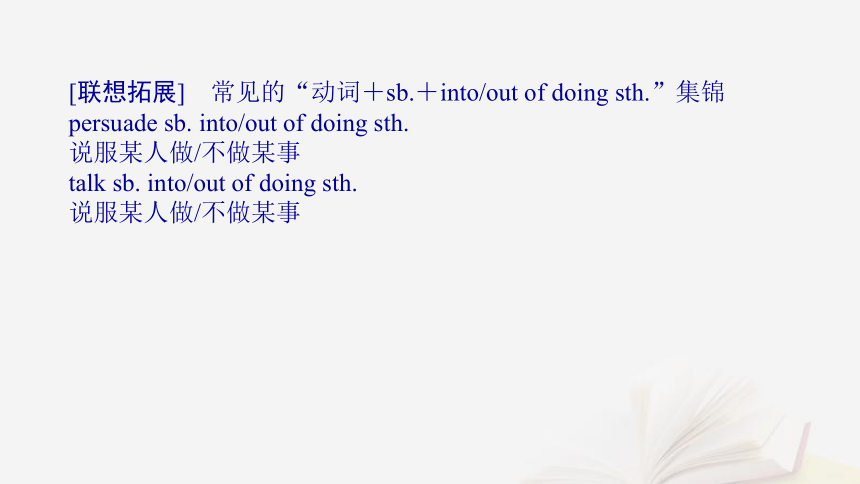
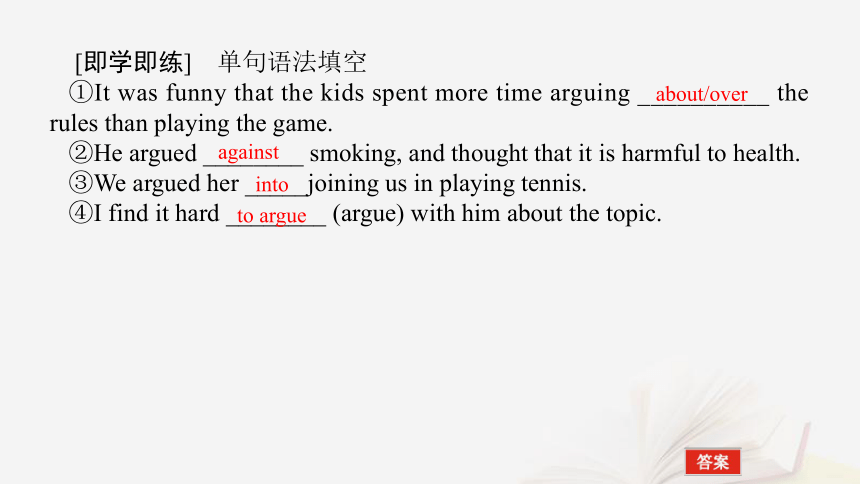
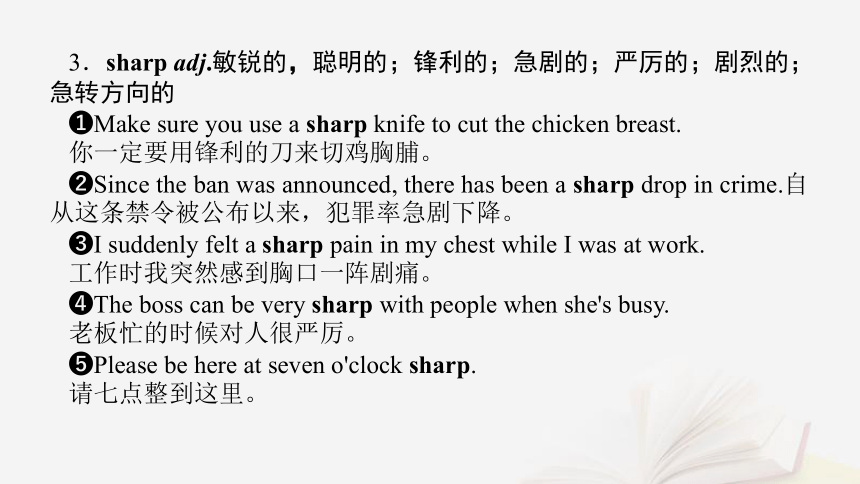
文档简介
(共69张PPT)
Section Ⅱ Using language
要点精研 探究学习
语法新知 对接课堂
语法探究 核心突破
课时达标·随堂自测
要点精研 探究学习
1.debate n.讨论,辩论 vi.& vt.辩论;讨论
The proposal under debate was put forward by the chairman.那个正在讨论中的提议是由主席提出来的。
After years of heated debate, gray wolves were reintroduced to Yellowstone National Park.
经过多年的激烈辩论,灰狼重新回到黄石国家公园。
He debated with our maths teacher about the solution to the problem.他和我们的数学老师讨论这个问题的解法。
The experts are debating how to solve the mystery of the Amber Room's disappearance.
专家们正在讨论如何解开琥珀屋消失之谜。
[归纳探究]
(1)under debate 正在讨论中
beyond debate 无可争论
a heated/lively debate (on/about/over sth.)
一场(关于某事的)激烈的/热烈的争论
(2)debate (with sb.) about/on/over sth.
(与某人)辩论/讨论某事
[联想拓展] 与debate意义相近的词:
discuss v.讨论 quarrel v.争吵 debate v.辩论 argue v.争论,辩论
[即学即练] 单句语法填空/完成句子
①The two sides debated _____ each other ____________ the question of the origin (起源) of the universe.
②The question of building a new library in this city is still ________ debate.
③经过一场激烈的辩论,我们就这一计划达成了一致意见。
After _____________, we agreed on the plan.
④中国一直在国际事务中扮演着重要的角色,这是毋庸置疑的。
It is ____________that China has been playing an important role in the international affairs.
with
on/about/over
under
a heated debate
beyond debate
2.argue v.争论,争辩 vt.& vi.论证;争辩
He argued with the taxi driver about the fare.
他就车费与出租车司机争论。
She argued that our attempt would be a waste of time.
她认为我们的尝试将是浪费时间。
I argued for the plan while my elder sister argued against it.
我赞成这个计划,而我的姐姐反对它。
We tried to argue him out of going on such a dangerous journey.我们努力说服他不要踏上如此危险的旅程。
[归纳探究]
(1)argue with sb. about/over sth. 就某事与某人争论
(2)argue that... 主张,认为……
argue for/against (doing) sth. 据理力争/反对(做)某事
argue sb. into/out of doing sth. 说服某人做/不做某事
[联想拓展] 常见的“动词+sb.+into/out of doing sth.”集锦
persuade sb. into/out of doing sth.
说服某人做/不做某事
talk sb. into/out of doing sth.
说服某人做/不做某事
[即学即练] 单句语法填空
①It was funny that the kids spent more time arguing __________ the rules than playing the game.
②He argued ________ smoking, and thought that it is harmful to health.
③We argued her _____joining us in playing tennis.
④I find it hard ________ (argue) with him about the topic.
about/over
against
into
to argue
3.sharp adj.敏锐的,聪明的;锋利的;急剧的;严厉的;剧烈的;急转方向的
Make sure you use a sharp knife to cut the chicken breast.
你一定要用锋利的刀来切鸡胸脯。
Since the ban was announced, there has been a sharp drop in crime.自从这条禁令被公布以来,犯罪率急剧下降。
I suddenly felt a sharp pain in my chest while I was at work.
工作时我突然感到胸口一阵剧痛。
The boss can be very sharp with people when she's busy.
老板忙的时候对人很严厉。
Please be here at seven o'clock sharp.
请七点整到这里。
[归纳探究]
(1)sharply adv. 猛烈地;急剧地
(2)sharpen vt.& vi. (使)变得锋利
(3)sharpener n. 磨具;削具
[联想拓展] adj./n.+en变为v.的单词小结
strength n.力气→strengthen v.巩固
deep adj.深的→deepen v.加深
wide adj.宽的→widen v.加宽
length n.长度→lengthen v.延长
[即学即练] 判断下列句子中sharp的含义/用sharp的适当形式填空
①You need a sharp knife to cut through the knot (结).__________
②The lecture starts at 6:00 sharp. Latecomers will not be admitted (允许引入).____________
③If your awareness (意识) is as sharp as it could be, you'll have no trouble answering these questions.__________
④Nowadays, there is a sharp increase in children's creativity, for they are greatly encouraged to develop their talents.___________
⑤She looked at him coldly and her words sounded sharp.________________
⑥During the last three decades (十年), the number of people joining in physical fitness programs has increased ________.
⑦The man was ________ his knife with a ________ when I entered the room.
锋利的
(时间)整点
敏锐的
急剧的
(人或言语)尖锐的
sharply
sharpening
sharpener
4.various adj.各种各样的,各种不同的
My doctor said I should vary my diet more.
医生说我应该使日常饮食更加多样化。
The prices of some goods vary with the season.
某些商品的价格随季节变动。
We grow a variety of crops, including cabbages, wheat and potatoes.我们种了各种作物,包括卷心菜、小麦和土豆。
[归纳探究]
(1)vary vt.& vi. 不同;变化;使多样化
vary from...to... 从……到……不等;在……到……之间变动
vary with... 随……变动
(2)variety n. 变化,多样化;种类,品种
a variety/varieties of... 各种各样的……
[语境助记] The friendship between the people of the two countries has been strengthened through various means.
两国人民之间的友谊通过各种方式得到了加强。
[联想拓展] 与various意思相近的词:
varied adj.各种各样的 different adj.不同的 diverse adj.多种多样的
[即学即练] 单句语法填空
①There are ________ (vary) solutions to your problem.
②For Chinese people, there're a ______ (vary) of activities to celebrate the traditional festivals.
③The café offers a wide _______ (vary) of sandwiches in order to attract customers.
④A variety of his books _____ (have) been published and the variety of his writings ____ (be) surprising.
⑤The variety of fruits in this supermarket ____ (be) rich.
various
variety
variety
have
is
is
5.apply v.申请;应用
I'm writing to apply for the position as a student volunteer.
我写信是为了申请学生志愿者的职位。
She applied to the international school for a job as an English teacher.她向这所国际学校申请了一个英语教师的职位。
Some cyclists think that traffic laws do not apply to them. It is not true,though.有些骑自行车的人认为交通法规不适用于他们。但事实并非如此。
Later I decided to apply my previous experience to learning how to read and write.
后来,我决定把我以前的经验应用到学习怎样读和写中。
She applied herself to learning English.她专心学习英语。
You will pass your exams only if you really apply yourself to your study.你只有真正地专心学习,才能通过考试。
However, technology is also the application of scientific knowledge to solve a problem, touching lives in countless ways.然而,科技也是应用科学知识来解决问题,以无数的方式触及生活。
[归纳探究]
(1)apply for 申请
apply to sb. for sth. 向某人申请……
apply sth. to sth. 把……应用到……
apply oneself to 致力于
(2)a job application 求职信
fill in an application form 填写申请表
a written application 书面申请
make an application to sb. for... 向某人(某机构)申请……
[一言巧记] The applicant applied himself to applying for a post for teaching applied chemistry, saying that he would apply what he had learnt to his teaching.
这位申请人专心于申请一份教应用化学的工作,并且说他会把他所学到的应用到他的教学中去。
[语块积累] 表示“致力于;专心于”的常用短语:
①be absorbed in
②apply oneself to
③devote oneself to
④put one's heart into
⑤be buried in/bury oneself in
⑥be lost in/lose oneself in
[即学即练] 单句语法填空
①He graduated with high enough marks to apply ____ a university.
②If you apply yourself ____ the job, in my opinion, you'll soon get promoted.
③The questions on this part of the form only apply ____ married men.
④I have been out of work for half a year, so I want to apply ____ a job in this company.
⑤Make sure that you apply the theory ____ practice.
for
to
to
for
to
6.schedule n.计划表,进度表,日程表 v.安排;预定
Now she is planning our schedule for the trip.
现在,她正为这次旅行制订我们的计划。
Having worked for two days, Steve managed to finish his report on schedule.工作两天后,史蒂夫设法按时完成了报告。
With the help of our English teacher, we accomplished the project ahead of schedule.
在我们英语老师的帮助下,我们提前完成了项目。
The tunnel project has already fallen behind schedule.
隧道工程已经晚了工期。
The meeting scheduled to be held on Tuesday morning is of great importance.预计将在周二早上召开的会议非常重要。
[归纳探究]
(1)on schedule 准时,按预定时间
ahead of schedule(=ahead of time)提前,先于预定时间
behind schedule 迟于预定时间
have a tight/busy schedule 日程安排得紧
(2)schedule...for... 把……安排在……
be scheduled to do sth. 被安排做某事
[即学即练] 单句语法填空
①The operation on the old man will be carried out _____ schedule.
②I'm calling to cancel the meeting we ________ (schedule) for this afternoon.
③The party is scheduled ____ the weekend.
④Our guests are scheduled ________ (arrive) at 7:30 in the evening.
on
scheduled
for
to arrive
7.take up 占用(时间、空间等);拿起;开始;继续
The big table takes up too much room.
那张大桌子占的地方太大了。
Learning French takes up a lot of my time.
学法语占了我大量的时间。
It is not difficult to take up a new career in midlife.
人到中年开始新的事业并不难。
Amy took up dancing for a while, but soon took interest in painting.Amy有段时间喜欢跳舞,但很快又对画画感兴趣。
I was on a plane that was about to take off when my phone rang.当电话响起时,我正坐在一个即将起飞的飞机上。
[归纳探究]
(1)take in 吸收;理解;欺骗
(2)take on 呈现;雇用;承担
(3)take off 脱下;起飞
(4)take over 接管;接替
(5)take...apart 拆开
[写作佳句] There are just too many things for the eye to take in.那么多品种,都让人看花眼了。
[即学即练] 判断下列句子中take up的含义/用take的相关短语完成句子
①After studying in a medical college for five years, Jane took up her job as a doctor in the countryside.___________
②Although basketball took up most of my leisure (闲暇) time, I didn't neglect (忽视) my study.____________
③“No, no, no,”says Damon, taking up where Dave left off._______
④Briggs will ________ as general manager when Mitchell retires (退休).
⑤The more fat you ________ before bedtime, the greater burden you will put on your body at night.
⑥Let's ________ the text where we stopped yesterday.
开始从事
占用(时间)
继续
take over
take in
take up
8.(教材P8)These activities not only help them gain more skills, but also teach them to care about others.
这些活动不仅帮助他们获得更多的技能,而且教会他们关心他人。
[句式解构] 本句型属于not only...but also结构
not only...but (also)...是并列连词,连接两个在语法上并列的成分(如并列主语、谓语、表语、宾语和状语,可以由单词、短语或句子来充当这些句子成分),虽然并列,但在语意上强调but (also) 后的成分。
Not only my deskmate but also I like drawing.
不仅我同桌,而且我也喜欢画画。(连接并列主语)
He not only applied for the position but also took part in their activity.他不仅申请了这个职位,而且还参加了他们的活动。(连接并列谓语)。
The band's performance is not only interesting but also exciting.
乐队的表演不仅有趣,而且令人兴奋。(连接并列表语)
My English teacher speaks not only English but also Russian.
我的英语老师不仅说英语,还说俄语。(连接并列宾语)
[熟词生义] not only...but (also)...连接并列主语时,谓语动词要遵循“就近原则”。
not only只能连用,而but also既可连用,也可分开用,also也可省略。
[即学即练] 完成句子/单句语法填空
①你或许也开始注意到不仅对你的健康而且对你的钱包的影响。
You might also begin to notice the effects ________ on your health _____ in your pocket.
②When I look at this picture of myself, I realize how fast time flies. I had grown not only physically, but also ________ (mental) in the past few years.
③Not only Tom and Mary but also I _____ (be) fond of watching television.
④Not only the mother but the children _____ (be) also sick.
⑤It was not until I came here that I realized this place was famous for not only its ________ (beautiful) but also its weather.
not only
but
mentally
am
are
beauty
重要词汇和语块背诵
(1)构词法梳理与背诵
派生法构词
·post vt.张贴;公布;邮寄→poster n.海报
·debate n.讨论,辩论→debatable adj.有争议的,可争辩的
·argue v.争论,争辩→argument n.论证;论据;争吵
·sharp adj.敏锐的,聪明的→sharply adv.急剧地;严厉地
·intelligent adj.有智慧的,聪明的→intelligence n.智力;才智
·investigate v.查明,调查→investigation n.调查;科学研究
·vary v.(大小、形状等)相异,不同,有别;(根据情况)变化,变更,改变
→various adj.各种各样的,各种不同的
→variety n.不同种类;变化,多样性
·volunteer n.志愿者,义务工作者,自愿参加者→voluntary adj.自愿的;志愿的;自发的
·apply v.申请;涂,敷;应用;使用
→applied adj.应用的;实用的
→applicant n.申请人
→application n.应用;申请;应用程序;敷用
·schedule n.计划表,进度表,日程表→scheduled adj.事先安排的;按时刻表的
转化法构词
·band n.带子,环;条纹,条饰;波段;(数目、年龄、价格等的)范围,段;乐队,乐团→v.加彩条;(将价格、收入等)划分档次,分等级
·debate v.讨论,辩论;仔细考虑→n.讨论,辩论
·stage n.舞台→v.举行;上演;筹划
·volunteer n.志愿者,义务工作者,自愿参加者→v.自愿做;义务做;无偿做;主动建议(或告诉)
·gain v.获得,赢得→n.增值;增加;好处;利润;收益(No pain,no gain.不劳无获。)
(2)教材语块梳理与背诵
·a white haired man 一位白发老人
·breathe deeply 深呼吸
·look at them in panic 惊慌地看着他们
·make me a lot more relaxed
让我放松了很多
·play badminton 打羽毛球
·a band of 一伙;一帮
·debate with sb. about/over sth.
与某人辩论某事
·play the piano 弹钢琴
·on stage 在舞台上
·take part in various after school activities
参加各种课外活动
·such as volunteer work 例如志愿者工作
·not only...but also... 不仅……而且……
·teach them to care about others
教会他们关心他人
·play a part 扮演一个角色;起作用
·apply to college 申请大学
·take up a lot of time 占用很多时间
·courses in time management
时间管理课程
·do activities after school 做一些课外活动
·face the challenges 面对挑战
·make notes of key information
记录关键信息
·come across 偶遇
语法新知 对接课堂
简单句的基本句型
一、语法现象感知
①I replied.
②She agreed.
③He has travelled all over the world.
④The machine works smoothly.
⑤He wrote a long letter.
⑥I saw a white haired man.
⑦I got to school early this morning.
⑧She is listening to the speaker carefully.
⑨He gave me a smile.
⑩I passed him a book.
His words made me a lot more relaxed.
The exam made me quite nervous.
I was embarrassed.
He was friendly.
二、语法规则理解
1.①②句为“____________”结构,其中作谓语的动词为不及物动词。
2.③④句为“主语+谓语+_______”结构,其中作谓语的动词为__________。
3.⑤⑥句为“主语+谓语+宾语”结构,其中作谓语的动词为__________。
4.⑦⑧句为“主语+谓语(动词+介词)+宾语+状语”结构,其中作谓语的动词为____________。
5.⑨⑩句为“主语+谓语+双宾语”结构,其中指物的名词作________,指人的名词或代词作________。
6. 句为“主语+谓语+宾语+宾语补足语”结构,其中____________对宾语进行补充说明,并与宾语之间构成逻辑上的主谓关系。
7. 句为“__________________”结构,其中系动词不能表达完整的意思。
主语+谓语
状语
及物动词
不及物动词
不及物动词
直接宾语
间接宾语
宾语补足语
主语+系动词+表语
微点拨 句子成分的表示法:S: Subject (主语), V: Verb (动词), O: Object (宾语), IO: Indirect Object (间接宾语), DO: Direct Object (直接宾语), P: Predicative (表语), OC: Object Complement (宾语补足语), AD (状语)。
语法探究 核心突破
一、句子的基本成分
根据英语词汇在句子中的地位和作用,英语的句子成分可分为主语、谓语、表语、宾语、定语、状语、宾语补足语、同位语及独立成分等。
1.主语:表示句子说的是什么人或什么事。通常由名词、代词、数词、名词化的形容词、动词不定式、动名词、从句等充当。
She went out in a hurry.(代词)
To see is to believe.(动词不定式)
Smoking is bad for health.(动名词)
What he has said is true.(从句)
2.谓语:说明主语做什么或怎么样。通常由动词或动词短语充当,位于主语之后。实义动词可以单独作谓语,连系动词需要和表语一起构成谓语;情态动词和助动词需要和实义动词一起构成谓语。
We appreciate your help a lot.(实义动词)
He can speak English well.(情态动词+动词原形)
She is talking with her sister.(助动词+实义动词)
The newly baked bread tastes delicious.(连系动词+表语)
3.表语:用以说明主语的身份、特征和状态。一般位于系动词之后,由名词、代词、形容词、分词、数词、不定式、动名词、介词短语、副词及表语从句充当。
His job is taking care of children.(动名词短语)
That's why he came here.(从句)
That remains a puzzle.(名词)
They seem to know the truth.(动词不定式)
The speech is exciting.(形容词)
4.宾语:表示动作的对象或承受者,一般位于及物动词和介词后面。常由名词、代词、动名词、不定式或相当于名词的词组和句子充当。
(1)直接宾语表示动作的承受者或结果,通常指物。
(2)间接宾语表示动作的接受者或指向,它位于直接宾语之前;位于直接宾语之后时,其前面则常加介词to或for。
She didn't say anything.(代词)
Did you write down what he said?(从句)
I succeeded in passing the exam.(动名词短语)
Would you like show me your passport?(间接宾语和直接宾语)
5.宾语补足语:补充说明宾语的成分叫宾语补足语。一般由形容词、名词、副词、不定式、分词和介词短语等充当。
We found it necessary to study English.(形容词)
We made him monitor in our class.(名词)
We found him in trouble now.(介词短语)
6.定语:修饰名词或代词的词、短语或从句称为定语。一般由形容词、名词、代词、数词、副词、不定式、动名词、分词、介词短语和从句等充当。
There are 54 students in our class.(数词)
There is a reading room in the library.(动名词)
Tell the children playing there not to make any noise.(现在分词)
His spoken language is good.(过去分词)
That is the reason why I am against your advice.(从句)
7.状语:修饰动词、形容词、副词或整个句子,说明动作或状态特征的句子成分,叫状语。一般由副词、名词、数词、形容词、不定式、分词、介词短语、独立主格和从句等充当。可表示时间、地点、原因、目的、结果、方式、伴随、条件、程度、让步、频率等。
He loves science fiction in particular.(介词短语)
His parents died, leaving him an orphan.(现在分词)
Please call me if it is necessary.(从句)
Suddenly, I heard the bird sing a song.(副词)
You run into the grocery store to pick up one bottle of water.(动词不定式)
[即学即练] 写出下列句中加黑部分所作的句子成分
①The performance on the stage is quite different from that in the movie.________
②His wish is to become a scientist.________
③Great changes have taken place in China since 1980.________
④He noticed a man enter the room.________
⑤Would you tell me your advice?____________________________
⑥I opened the window to let some fresh air in._______
⑦I'll never forget the day when I worked together with you.______
主语
表语
谓语
宾语补足语
me为间接宾语; your advice为直接宾语
状语
定语
二、七种基本句型
1.S+V:主语(Subject)+谓语(Verb)
The rain stopped.雨停了。
The sun has risen.太阳升起来了。
句型特点总结:谓语动词是不及物动词,本身能表达完整的意思,后面不需接宾语,但有时可接副词、介词短语等作状语。
2.S+V+Adverbial:主语(Subject)+谓语(Verb)+状语(Adverbial)
We'll leave next week.我们下周动身。
The old man is walking in the park.
那个老人正在公园里散步。
句型特点总结:本结构中充当谓语的不及物动词后常常跟状语才能表达完整的意思,状语包括时间状语、地点状语、方式状语、程度状语等。
3.S+V+O:主语(Subject)+谓语(Verb)+宾语(Object)
We are learning English.我们正在学习英语。
I don't know him.我不认识他。
句型特点总结:谓语动词是及物动词,不能表达完整的意思,其后必须要接一个宾语。
4.S+V (vi.+prep.)+O+Adverbial:主语(Subject)+谓语(Verb)+宾语(Object)+状语(Adverbial)
I lived in Beijing five years ago.五年前我住在北京。
They are waiting for the bus patiently.
他们正耐心地等公交车。
句型特点总结:本结构中的动词为不及物动词,所以必须加上介词才能跟宾语;另外加上状语表达的意思更完整。
5.S+V+IO+DO:主语(Subject)+谓语(Verb)+间接宾语(Indirect Object)+直接宾语(Direct Object)
Her mother bought her a skirt.
她妈妈给她买了一条裙子。
Mr Li told us an interesting story.
李先生给我们讲了一个非常有趣的故事。
句型特点总结:谓语动词后接有两个宾语,这两个宾语都是动作的对象或承受者,其中指人的是间接宾语,指物的是直接宾语。当间接宾语放在直接宾语之后时,其前通常需要加介词for或to。
6.S+V+O+C:主语(Subject)+谓语(Verb)+宾语(Object)+补语(Complement)
The news made us sad.那个消息令我们难过。
The teacher asked us to answer the question.
老师叫我们回答那个问题。
We must keep our school clean.
我们必须保持学校干净。
句型特点总结:谓语动词后虽然已接一个宾语,但意思还不完整,必须再加上另外一个成分(宾语补足语)对宾语进行补充说明。可以用作宾语补足语的有名词、形容词、副词、不定式、动名词、分词、介词短语等。
7.S+V+P:主语(Subject)+系动词(Link Verb)+表语(Predicative)
My sister is a nurse.我姐姐是个护士。
I feel quite hungry.我感觉很饿。
The ball is under the desk.那个球在书桌底下。
句型特点总结:谓语动词是系动词,不能表达完整的意思,其后必须接一个能表明主语特征、身份、状态的表语。常见的系动词有: be (是), become (成为), get (变得), turn (变得), grow (变得), look (看起来), feel (感到), smell (闻起来), taste (尝起来), sound (听起来), seem (似乎), keep (保持), stay (保持)等。
微点拨 (1)巧记基本句型,英语句子万万千,基本句型把线牵;
句型种类看动词,后接什么是关键;
系词后面接表语,vi.独身无牵连;
vt.又可分三类,单宾双宾最常见;
还有宾语补足语,各种搭配记心间。
(2)七种基本句型要记牢
①主语+系动词+表语
②主语+不及物动词
③主语+不及物动词+状语
④主语+及物动词+宾语
⑤主语+不及物动词+介词+宾语
⑥主语+及物动词+宾语+宾语补足语
⑦主语+及物动词+间接宾语+直接宾语
[即学即练] 观察以下课文原句并思考下列句子属于哪个基本句型
①After I had pictured it over and over again.
②The campus was still quiet when I arrived.
③With butterflies in my stomach, I breathed deeply.
④I'm wondering what life is going to be like here.
⑤He gave me a smile.
⑥Everyone started laughing.
⑦It all depends on what you do.
⑧His words made me a lot more relaxed.
归纳填空
③
①④⑥⑦
②
⑤
⑧
课时达标·随堂自测
单句语法填空
1.Recently we had a heated debate ____________ which way is better to get work done, working individually (各自地) or working in a team.
2.We argued _____ the waiter ________ the price of the meal.
3.—Hi, Tina. We're going to Sam's house to celebrate his graduation. Would you like to come ______?
—Great! Let's go.
4.Though he was world famous, Einstein didn't really care _____ his clothes.
about/over/on
with
about/over
along
about
5.Have you applied ____ Mr Black ____ the post It's worth a try.
6.After knocking politely at the door, the ________ (apply) entered the office of the general manager.
7.After Tom retired from office, he took ____ painting as his hobby.
8.As adults, we should stay calm whatever challenges we come ______ in work.
9.Not only the students but also the teacher _____ (be) invited to the opening ceremony of the grand science museum last week.
to
for
applicant
up
across
was
Section Ⅱ Using language
要点精研 探究学习
语法新知 对接课堂
语法探究 核心突破
课时达标·随堂自测
要点精研 探究学习
1.debate n.讨论,辩论 vi.& vt.辩论;讨论
The proposal under debate was put forward by the chairman.那个正在讨论中的提议是由主席提出来的。
After years of heated debate, gray wolves were reintroduced to Yellowstone National Park.
经过多年的激烈辩论,灰狼重新回到黄石国家公园。
He debated with our maths teacher about the solution to the problem.他和我们的数学老师讨论这个问题的解法。
The experts are debating how to solve the mystery of the Amber Room's disappearance.
专家们正在讨论如何解开琥珀屋消失之谜。
[归纳探究]
(1)under debate 正在讨论中
beyond debate 无可争论
a heated/lively debate (on/about/over sth.)
一场(关于某事的)激烈的/热烈的争论
(2)debate (with sb.) about/on/over sth.
(与某人)辩论/讨论某事
[联想拓展] 与debate意义相近的词:
discuss v.讨论 quarrel v.争吵 debate v.辩论 argue v.争论,辩论
[即学即练] 单句语法填空/完成句子
①The two sides debated _____ each other ____________ the question of the origin (起源) of the universe.
②The question of building a new library in this city is still ________ debate.
③经过一场激烈的辩论,我们就这一计划达成了一致意见。
After _____________, we agreed on the plan.
④中国一直在国际事务中扮演着重要的角色,这是毋庸置疑的。
It is ____________that China has been playing an important role in the international affairs.
with
on/about/over
under
a heated debate
beyond debate
2.argue v.争论,争辩 vt.& vi.论证;争辩
He argued with the taxi driver about the fare.
他就车费与出租车司机争论。
She argued that our attempt would be a waste of time.
她认为我们的尝试将是浪费时间。
I argued for the plan while my elder sister argued against it.
我赞成这个计划,而我的姐姐反对它。
We tried to argue him out of going on such a dangerous journey.我们努力说服他不要踏上如此危险的旅程。
[归纳探究]
(1)argue with sb. about/over sth. 就某事与某人争论
(2)argue that... 主张,认为……
argue for/against (doing) sth. 据理力争/反对(做)某事
argue sb. into/out of doing sth. 说服某人做/不做某事
[联想拓展] 常见的“动词+sb.+into/out of doing sth.”集锦
persuade sb. into/out of doing sth.
说服某人做/不做某事
talk sb. into/out of doing sth.
说服某人做/不做某事
[即学即练] 单句语法填空
①It was funny that the kids spent more time arguing __________ the rules than playing the game.
②He argued ________ smoking, and thought that it is harmful to health.
③We argued her _____joining us in playing tennis.
④I find it hard ________ (argue) with him about the topic.
about/over
against
into
to argue
3.sharp adj.敏锐的,聪明的;锋利的;急剧的;严厉的;剧烈的;急转方向的
Make sure you use a sharp knife to cut the chicken breast.
你一定要用锋利的刀来切鸡胸脯。
Since the ban was announced, there has been a sharp drop in crime.自从这条禁令被公布以来,犯罪率急剧下降。
I suddenly felt a sharp pain in my chest while I was at work.
工作时我突然感到胸口一阵剧痛。
The boss can be very sharp with people when she's busy.
老板忙的时候对人很严厉。
Please be here at seven o'clock sharp.
请七点整到这里。
[归纳探究]
(1)sharply adv. 猛烈地;急剧地
(2)sharpen vt.& vi. (使)变得锋利
(3)sharpener n. 磨具;削具
[联想拓展] adj./n.+en变为v.的单词小结
strength n.力气→strengthen v.巩固
deep adj.深的→deepen v.加深
wide adj.宽的→widen v.加宽
length n.长度→lengthen v.延长
[即学即练] 判断下列句子中sharp的含义/用sharp的适当形式填空
①You need a sharp knife to cut through the knot (结).__________
②The lecture starts at 6:00 sharp. Latecomers will not be admitted (允许引入).____________
③If your awareness (意识) is as sharp as it could be, you'll have no trouble answering these questions.__________
④Nowadays, there is a sharp increase in children's creativity, for they are greatly encouraged to develop their talents.___________
⑤She looked at him coldly and her words sounded sharp.________________
⑥During the last three decades (十年), the number of people joining in physical fitness programs has increased ________.
⑦The man was ________ his knife with a ________ when I entered the room.
锋利的
(时间)整点
敏锐的
急剧的
(人或言语)尖锐的
sharply
sharpening
sharpener
4.various adj.各种各样的,各种不同的
My doctor said I should vary my diet more.
医生说我应该使日常饮食更加多样化。
The prices of some goods vary with the season.
某些商品的价格随季节变动。
We grow a variety of crops, including cabbages, wheat and potatoes.我们种了各种作物,包括卷心菜、小麦和土豆。
[归纳探究]
(1)vary vt.& vi. 不同;变化;使多样化
vary from...to... 从……到……不等;在……到……之间变动
vary with... 随……变动
(2)variety n. 变化,多样化;种类,品种
a variety/varieties of... 各种各样的……
[语境助记] The friendship between the people of the two countries has been strengthened through various means.
两国人民之间的友谊通过各种方式得到了加强。
[联想拓展] 与various意思相近的词:
varied adj.各种各样的 different adj.不同的 diverse adj.多种多样的
[即学即练] 单句语法填空
①There are ________ (vary) solutions to your problem.
②For Chinese people, there're a ______ (vary) of activities to celebrate the traditional festivals.
③The café offers a wide _______ (vary) of sandwiches in order to attract customers.
④A variety of his books _____ (have) been published and the variety of his writings ____ (be) surprising.
⑤The variety of fruits in this supermarket ____ (be) rich.
various
variety
variety
have
is
is
5.apply v.申请;应用
I'm writing to apply for the position as a student volunteer.
我写信是为了申请学生志愿者的职位。
She applied to the international school for a job as an English teacher.她向这所国际学校申请了一个英语教师的职位。
Some cyclists think that traffic laws do not apply to them. It is not true,though.有些骑自行车的人认为交通法规不适用于他们。但事实并非如此。
Later I decided to apply my previous experience to learning how to read and write.
后来,我决定把我以前的经验应用到学习怎样读和写中。
She applied herself to learning English.她专心学习英语。
You will pass your exams only if you really apply yourself to your study.你只有真正地专心学习,才能通过考试。
However, technology is also the application of scientific knowledge to solve a problem, touching lives in countless ways.然而,科技也是应用科学知识来解决问题,以无数的方式触及生活。
[归纳探究]
(1)apply for 申请
apply to sb. for sth. 向某人申请……
apply sth. to sth. 把……应用到……
apply oneself to 致力于
(2)a job application 求职信
fill in an application form 填写申请表
a written application 书面申请
make an application to sb. for... 向某人(某机构)申请……
[一言巧记] The applicant applied himself to applying for a post for teaching applied chemistry, saying that he would apply what he had learnt to his teaching.
这位申请人专心于申请一份教应用化学的工作,并且说他会把他所学到的应用到他的教学中去。
[语块积累] 表示“致力于;专心于”的常用短语:
①be absorbed in
②apply oneself to
③devote oneself to
④put one's heart into
⑤be buried in/bury oneself in
⑥be lost in/lose oneself in
[即学即练] 单句语法填空
①He graduated with high enough marks to apply ____ a university.
②If you apply yourself ____ the job, in my opinion, you'll soon get promoted.
③The questions on this part of the form only apply ____ married men.
④I have been out of work for half a year, so I want to apply ____ a job in this company.
⑤Make sure that you apply the theory ____ practice.
for
to
to
for
to
6.schedule n.计划表,进度表,日程表 v.安排;预定
Now she is planning our schedule for the trip.
现在,她正为这次旅行制订我们的计划。
Having worked for two days, Steve managed to finish his report on schedule.工作两天后,史蒂夫设法按时完成了报告。
With the help of our English teacher, we accomplished the project ahead of schedule.
在我们英语老师的帮助下,我们提前完成了项目。
The tunnel project has already fallen behind schedule.
隧道工程已经晚了工期。
The meeting scheduled to be held on Tuesday morning is of great importance.预计将在周二早上召开的会议非常重要。
[归纳探究]
(1)on schedule 准时,按预定时间
ahead of schedule(=ahead of time)提前,先于预定时间
behind schedule 迟于预定时间
have a tight/busy schedule 日程安排得紧
(2)schedule...for... 把……安排在……
be scheduled to do sth. 被安排做某事
[即学即练] 单句语法填空
①The operation on the old man will be carried out _____ schedule.
②I'm calling to cancel the meeting we ________ (schedule) for this afternoon.
③The party is scheduled ____ the weekend.
④Our guests are scheduled ________ (arrive) at 7:30 in the evening.
on
scheduled
for
to arrive
7.take up 占用(时间、空间等);拿起;开始;继续
The big table takes up too much room.
那张大桌子占的地方太大了。
Learning French takes up a lot of my time.
学法语占了我大量的时间。
It is not difficult to take up a new career in midlife.
人到中年开始新的事业并不难。
Amy took up dancing for a while, but soon took interest in painting.Amy有段时间喜欢跳舞,但很快又对画画感兴趣。
I was on a plane that was about to take off when my phone rang.当电话响起时,我正坐在一个即将起飞的飞机上。
[归纳探究]
(1)take in 吸收;理解;欺骗
(2)take on 呈现;雇用;承担
(3)take off 脱下;起飞
(4)take over 接管;接替
(5)take...apart 拆开
[写作佳句] There are just too many things for the eye to take in.那么多品种,都让人看花眼了。
[即学即练] 判断下列句子中take up的含义/用take的相关短语完成句子
①After studying in a medical college for five years, Jane took up her job as a doctor in the countryside.___________
②Although basketball took up most of my leisure (闲暇) time, I didn't neglect (忽视) my study.____________
③“No, no, no,”says Damon, taking up where Dave left off._______
④Briggs will ________ as general manager when Mitchell retires (退休).
⑤The more fat you ________ before bedtime, the greater burden you will put on your body at night.
⑥Let's ________ the text where we stopped yesterday.
开始从事
占用(时间)
继续
take over
take in
take up
8.(教材P8)These activities not only help them gain more skills, but also teach them to care about others.
这些活动不仅帮助他们获得更多的技能,而且教会他们关心他人。
[句式解构] 本句型属于not only...but also结构
not only...but (also)...是并列连词,连接两个在语法上并列的成分(如并列主语、谓语、表语、宾语和状语,可以由单词、短语或句子来充当这些句子成分),虽然并列,但在语意上强调but (also) 后的成分。
Not only my deskmate but also I like drawing.
不仅我同桌,而且我也喜欢画画。(连接并列主语)
He not only applied for the position but also took part in their activity.他不仅申请了这个职位,而且还参加了他们的活动。(连接并列谓语)。
The band's performance is not only interesting but also exciting.
乐队的表演不仅有趣,而且令人兴奋。(连接并列表语)
My English teacher speaks not only English but also Russian.
我的英语老师不仅说英语,还说俄语。(连接并列宾语)
[熟词生义] not only...but (also)...连接并列主语时,谓语动词要遵循“就近原则”。
not only只能连用,而but also既可连用,也可分开用,also也可省略。
[即学即练] 完成句子/单句语法填空
①你或许也开始注意到不仅对你的健康而且对你的钱包的影响。
You might also begin to notice the effects ________ on your health _____ in your pocket.
②When I look at this picture of myself, I realize how fast time flies. I had grown not only physically, but also ________ (mental) in the past few years.
③Not only Tom and Mary but also I _____ (be) fond of watching television.
④Not only the mother but the children _____ (be) also sick.
⑤It was not until I came here that I realized this place was famous for not only its ________ (beautiful) but also its weather.
not only
but
mentally
am
are
beauty
重要词汇和语块背诵
(1)构词法梳理与背诵
派生法构词
·post vt.张贴;公布;邮寄→poster n.海报
·debate n.讨论,辩论→debatable adj.有争议的,可争辩的
·argue v.争论,争辩→argument n.论证;论据;争吵
·sharp adj.敏锐的,聪明的→sharply adv.急剧地;严厉地
·intelligent adj.有智慧的,聪明的→intelligence n.智力;才智
·investigate v.查明,调查→investigation n.调查;科学研究
·vary v.(大小、形状等)相异,不同,有别;(根据情况)变化,变更,改变
→various adj.各种各样的,各种不同的
→variety n.不同种类;变化,多样性
·volunteer n.志愿者,义务工作者,自愿参加者→voluntary adj.自愿的;志愿的;自发的
·apply v.申请;涂,敷;应用;使用
→applied adj.应用的;实用的
→applicant n.申请人
→application n.应用;申请;应用程序;敷用
·schedule n.计划表,进度表,日程表→scheduled adj.事先安排的;按时刻表的
转化法构词
·band n.带子,环;条纹,条饰;波段;(数目、年龄、价格等的)范围,段;乐队,乐团→v.加彩条;(将价格、收入等)划分档次,分等级
·debate v.讨论,辩论;仔细考虑→n.讨论,辩论
·stage n.舞台→v.举行;上演;筹划
·volunteer n.志愿者,义务工作者,自愿参加者→v.自愿做;义务做;无偿做;主动建议(或告诉)
·gain v.获得,赢得→n.增值;增加;好处;利润;收益(No pain,no gain.不劳无获。)
(2)教材语块梳理与背诵
·a white haired man 一位白发老人
·breathe deeply 深呼吸
·look at them in panic 惊慌地看着他们
·make me a lot more relaxed
让我放松了很多
·play badminton 打羽毛球
·a band of 一伙;一帮
·debate with sb. about/over sth.
与某人辩论某事
·play the piano 弹钢琴
·on stage 在舞台上
·take part in various after school activities
参加各种课外活动
·such as volunteer work 例如志愿者工作
·not only...but also... 不仅……而且……
·teach them to care about others
教会他们关心他人
·play a part 扮演一个角色;起作用
·apply to college 申请大学
·take up a lot of time 占用很多时间
·courses in time management
时间管理课程
·do activities after school 做一些课外活动
·face the challenges 面对挑战
·make notes of key information
记录关键信息
·come across 偶遇
语法新知 对接课堂
简单句的基本句型
一、语法现象感知
①I replied.
②She agreed.
③He has travelled all over the world.
④The machine works smoothly.
⑤He wrote a long letter.
⑥I saw a white haired man.
⑦I got to school early this morning.
⑧She is listening to the speaker carefully.
⑨He gave me a smile.
⑩I passed him a book.
His words made me a lot more relaxed.
The exam made me quite nervous.
I was embarrassed.
He was friendly.
二、语法规则理解
1.①②句为“____________”结构,其中作谓语的动词为不及物动词。
2.③④句为“主语+谓语+_______”结构,其中作谓语的动词为__________。
3.⑤⑥句为“主语+谓语+宾语”结构,其中作谓语的动词为__________。
4.⑦⑧句为“主语+谓语(动词+介词)+宾语+状语”结构,其中作谓语的动词为____________。
5.⑨⑩句为“主语+谓语+双宾语”结构,其中指物的名词作________,指人的名词或代词作________。
6. 句为“主语+谓语+宾语+宾语补足语”结构,其中____________对宾语进行补充说明,并与宾语之间构成逻辑上的主谓关系。
7. 句为“__________________”结构,其中系动词不能表达完整的意思。
主语+谓语
状语
及物动词
不及物动词
不及物动词
直接宾语
间接宾语
宾语补足语
主语+系动词+表语
微点拨 句子成分的表示法:S: Subject (主语), V: Verb (动词), O: Object (宾语), IO: Indirect Object (间接宾语), DO: Direct Object (直接宾语), P: Predicative (表语), OC: Object Complement (宾语补足语), AD (状语)。
语法探究 核心突破
一、句子的基本成分
根据英语词汇在句子中的地位和作用,英语的句子成分可分为主语、谓语、表语、宾语、定语、状语、宾语补足语、同位语及独立成分等。
1.主语:表示句子说的是什么人或什么事。通常由名词、代词、数词、名词化的形容词、动词不定式、动名词、从句等充当。
She went out in a hurry.(代词)
To see is to believe.(动词不定式)
Smoking is bad for health.(动名词)
What he has said is true.(从句)
2.谓语:说明主语做什么或怎么样。通常由动词或动词短语充当,位于主语之后。实义动词可以单独作谓语,连系动词需要和表语一起构成谓语;情态动词和助动词需要和实义动词一起构成谓语。
We appreciate your help a lot.(实义动词)
He can speak English well.(情态动词+动词原形)
She is talking with her sister.(助动词+实义动词)
The newly baked bread tastes delicious.(连系动词+表语)
3.表语:用以说明主语的身份、特征和状态。一般位于系动词之后,由名词、代词、形容词、分词、数词、不定式、动名词、介词短语、副词及表语从句充当。
His job is taking care of children.(动名词短语)
That's why he came here.(从句)
That remains a puzzle.(名词)
They seem to know the truth.(动词不定式)
The speech is exciting.(形容词)
4.宾语:表示动作的对象或承受者,一般位于及物动词和介词后面。常由名词、代词、动名词、不定式或相当于名词的词组和句子充当。
(1)直接宾语表示动作的承受者或结果,通常指物。
(2)间接宾语表示动作的接受者或指向,它位于直接宾语之前;位于直接宾语之后时,其前面则常加介词to或for。
She didn't say anything.(代词)
Did you write down what he said?(从句)
I succeeded in passing the exam.(动名词短语)
Would you like show me your passport?(间接宾语和直接宾语)
5.宾语补足语:补充说明宾语的成分叫宾语补足语。一般由形容词、名词、副词、不定式、分词和介词短语等充当。
We found it necessary to study English.(形容词)
We made him monitor in our class.(名词)
We found him in trouble now.(介词短语)
6.定语:修饰名词或代词的词、短语或从句称为定语。一般由形容词、名词、代词、数词、副词、不定式、动名词、分词、介词短语和从句等充当。
There are 54 students in our class.(数词)
There is a reading room in the library.(动名词)
Tell the children playing there not to make any noise.(现在分词)
His spoken language is good.(过去分词)
That is the reason why I am against your advice.(从句)
7.状语:修饰动词、形容词、副词或整个句子,说明动作或状态特征的句子成分,叫状语。一般由副词、名词、数词、形容词、不定式、分词、介词短语、独立主格和从句等充当。可表示时间、地点、原因、目的、结果、方式、伴随、条件、程度、让步、频率等。
He loves science fiction in particular.(介词短语)
His parents died, leaving him an orphan.(现在分词)
Please call me if it is necessary.(从句)
Suddenly, I heard the bird sing a song.(副词)
You run into the grocery store to pick up one bottle of water.(动词不定式)
[即学即练] 写出下列句中加黑部分所作的句子成分
①The performance on the stage is quite different from that in the movie.________
②His wish is to become a scientist.________
③Great changes have taken place in China since 1980.________
④He noticed a man enter the room.________
⑤Would you tell me your advice?____________________________
⑥I opened the window to let some fresh air in._______
⑦I'll never forget the day when I worked together with you.______
主语
表语
谓语
宾语补足语
me为间接宾语; your advice为直接宾语
状语
定语
二、七种基本句型
1.S+V:主语(Subject)+谓语(Verb)
The rain stopped.雨停了。
The sun has risen.太阳升起来了。
句型特点总结:谓语动词是不及物动词,本身能表达完整的意思,后面不需接宾语,但有时可接副词、介词短语等作状语。
2.S+V+Adverbial:主语(Subject)+谓语(Verb)+状语(Adverbial)
We'll leave next week.我们下周动身。
The old man is walking in the park.
那个老人正在公园里散步。
句型特点总结:本结构中充当谓语的不及物动词后常常跟状语才能表达完整的意思,状语包括时间状语、地点状语、方式状语、程度状语等。
3.S+V+O:主语(Subject)+谓语(Verb)+宾语(Object)
We are learning English.我们正在学习英语。
I don't know him.我不认识他。
句型特点总结:谓语动词是及物动词,不能表达完整的意思,其后必须要接一个宾语。
4.S+V (vi.+prep.)+O+Adverbial:主语(Subject)+谓语(Verb)+宾语(Object)+状语(Adverbial)
I lived in Beijing five years ago.五年前我住在北京。
They are waiting for the bus patiently.
他们正耐心地等公交车。
句型特点总结:本结构中的动词为不及物动词,所以必须加上介词才能跟宾语;另外加上状语表达的意思更完整。
5.S+V+IO+DO:主语(Subject)+谓语(Verb)+间接宾语(Indirect Object)+直接宾语(Direct Object)
Her mother bought her a skirt.
她妈妈给她买了一条裙子。
Mr Li told us an interesting story.
李先生给我们讲了一个非常有趣的故事。
句型特点总结:谓语动词后接有两个宾语,这两个宾语都是动作的对象或承受者,其中指人的是间接宾语,指物的是直接宾语。当间接宾语放在直接宾语之后时,其前通常需要加介词for或to。
6.S+V+O+C:主语(Subject)+谓语(Verb)+宾语(Object)+补语(Complement)
The news made us sad.那个消息令我们难过。
The teacher asked us to answer the question.
老师叫我们回答那个问题。
We must keep our school clean.
我们必须保持学校干净。
句型特点总结:谓语动词后虽然已接一个宾语,但意思还不完整,必须再加上另外一个成分(宾语补足语)对宾语进行补充说明。可以用作宾语补足语的有名词、形容词、副词、不定式、动名词、分词、介词短语等。
7.S+V+P:主语(Subject)+系动词(Link Verb)+表语(Predicative)
My sister is a nurse.我姐姐是个护士。
I feel quite hungry.我感觉很饿。
The ball is under the desk.那个球在书桌底下。
句型特点总结:谓语动词是系动词,不能表达完整的意思,其后必须接一个能表明主语特征、身份、状态的表语。常见的系动词有: be (是), become (成为), get (变得), turn (变得), grow (变得), look (看起来), feel (感到), smell (闻起来), taste (尝起来), sound (听起来), seem (似乎), keep (保持), stay (保持)等。
微点拨 (1)巧记基本句型,英语句子万万千,基本句型把线牵;
句型种类看动词,后接什么是关键;
系词后面接表语,vi.独身无牵连;
vt.又可分三类,单宾双宾最常见;
还有宾语补足语,各种搭配记心间。
(2)七种基本句型要记牢
①主语+系动词+表语
②主语+不及物动词
③主语+不及物动词+状语
④主语+及物动词+宾语
⑤主语+不及物动词+介词+宾语
⑥主语+及物动词+宾语+宾语补足语
⑦主语+及物动词+间接宾语+直接宾语
[即学即练] 观察以下课文原句并思考下列句子属于哪个基本句型
①After I had pictured it over and over again.
②The campus was still quiet when I arrived.
③With butterflies in my stomach, I breathed deeply.
④I'm wondering what life is going to be like here.
⑤He gave me a smile.
⑥Everyone started laughing.
⑦It all depends on what you do.
⑧His words made me a lot more relaxed.
归纳填空
③
①④⑥⑦
②
⑤
⑧
课时达标·随堂自测
单句语法填空
1.Recently we had a heated debate ____________ which way is better to get work done, working individually (各自地) or working in a team.
2.We argued _____ the waiter ________ the price of the meal.
3.—Hi, Tina. We're going to Sam's house to celebrate his graduation. Would you like to come ______?
—Great! Let's go.
4.Though he was world famous, Einstein didn't really care _____ his clothes.
about/over/on
with
about/over
along
about
5.Have you applied ____ Mr Black ____ the post It's worth a try.
6.After knocking politely at the door, the ________ (apply) entered the office of the general manager.
7.After Tom retired from office, he took ____ painting as his hobby.
8.As adults, we should stay calm whatever challenges we come ______ in work.
9.Not only the students but also the teacher _____ (be) invited to the opening ceremony of the grand science museum last week.
to
for
applicant
up
across
was
